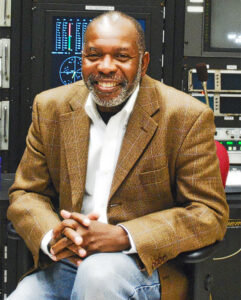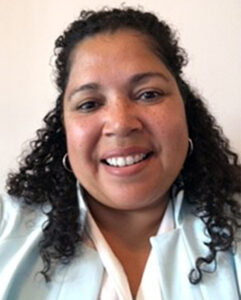Many colleges and universities offer a Master of Business Administration (MBA) or a master’s degree in strategic communication. Some Christian colleges offer these programs as well—and maybe even a few Bible colleges.
But what’s the differentiator in the MBA and Master of Arts in Strategic Communication Leadership degrees at Lancaster Bible College? At LBC, these two programs are grounded not only in biblical truth but also focus on the nonprofit realms of both business and communication.

Edward Jones (’24)
Hear from five master’s degree students who are currently enrolled in these two relevant, impactful and fully online programs at LBC. It was the LBC difference that made their choice easy when it came time to decide to continue their education and make a difference in the professional world.
The Rev. Edward Jones (’24) is a retired pastor and Bible teacher who also spent five decades working in television, radio and cable content creation and executive management. “I had been looking for a program in higher education that would academically formalize over 50 years of experience to enable me to enter the academy as an instructor,” he said. “I also wanted to advance my communication knowledge and skill to better understand how to leverage my ministry to reach a new generation with the message of the gospel through 21st-century technology.”
The nonprofit and ministry focus of LBC’s Master of Arts in Strategic Communication was a great fit for Edward because the college “provides a biblically based program that is consistent with my values and mission to faithfully and accurately interpret and communicate of the message of Jesus Christ and Christian ethics as presented in the Bible.”
At the age of 72, Edward followed Christ’s calling for his life long ago, but new learning and ministry expansion keeps students like him primed to continue their impact in the nonprofit world.
“God’s calling to service is also a call to prepare,” Edward shared. “My call to preach and teach the message of Christ requires continued growth and faithful stewardship of body, mind and spirit (1 Thessalonians 5:23). This program is providing me with the academic, spiritual and professional tools to be a more skillful communicator and leader.”
Edward also equates his relationship with LBC professors and peers with the message found in Proverbs 27:17: “Iron sharpens iron, so one man sharpens another.”
“The professional men and women professors, through their experience, instruction and desire to know and mentor their students, have expanded my goals, sharpened my focus and motivated me to overcome hurdles to pursue a vision and continue to fulfill God’s calling on my life,” he said. “In a word—‘inspiration.’ At my age, inspiration has a value that can only be appreciated when you have more yesterdays than tomorrows ahead of you.”
With years of education behind him in the physical classroom, Edward is embracing a way of learning, communicating and growing that is new to him.
“The online modality fits with my approach to time management and lifestyle and also my visual learning style,” he said. “It provides me with a clear plan of daily and weekly goals and objectives. The compressed scheduling can be challenging, but when it is achieved, provides quite a rewarding experience that I can share with my family.”

Sedeka (Dubuche ’22 & ’24) Cunningham
Sedeka (Dubuche ’22 & ’24) Cunningham already earned her Business Administration bachelor’s degree from LBC, and she’s now on track to earn a MBA in Nonprofit Management as well. Born and raised in Maryland to Haitian parents, Sedeka lives in Lancaster with her husband and son while working for Commercial Leading Closing Services and serving at her local church as a worship leader.
There’s a lot on Sedeka’s plate, but she says she loves to learn and enjoys “expanding my thinking of the business field. I’m excited to use all the tools and resources I’ve learned within this program in my current and future career path. The professors at LBC in this particular program are encouraging, knowledgeable and supportive on this journey, which makes learning captivating and engaging.”
Already familiar with LBC’s biblical worldview training from her undergraduate studies, Sedeka chose her alma mater to “continue to expand my learning in nonprofit as well as for-profit with a biblical framework. I’m gaining a deeper cognizance in the business world, (and) I’m learning the proper terminology, analysis, equations and services that will allow me to expand my learning.”
A busy mom, wife and professional, Sedeka says “the online modality of the program helps me to have an organized approach to the class. I get to see assignments and pace myself and not overthink each assignment. I also still feel connected to each of my peers because we remain in constant communication. Another great reason the online modality works for me is someone is usually always online or responds quickly due to the access of technology at your fingertips.”
Besides the connections with classmates, Sedeka has also valued building relationships with her professors. “I truly believe they want the best for me,” she said. “Each professor has a verifiable background in business that helps students like me gain from their vast expertise in topics such as nonprofit, for-profit and business from a biblical worldview.”

Carrie Puentes Bornmann (’24)
Throughout her career in marketing and communications, Carrie Puentes Bornmann (’24) always intended to earn a master’s degree in the communication field—but the timing never seemed right.
“When I moved to Central Pennsylvania, I learned of LBC’s terrific reputation for caring professors and a quality education,” said Carrie, a student in LBC’s Master of Arts in Strategic Communication Leadership program. “To receive a quality education from a Christian school like LBC is a dream come true. This combined with a practical curriculum and accelerated online learning made LBC the school for me.”
While Carrie is grateful for her experience working in the for-profit world of financial services, she dreamed of utilizing her skills for an organization that exists to make society better. “In addition to the practical skill development needed as a communications professional, the classes at LBC have taught me a new perspective about what a successful organization looks like in the eyes of God and for our brothers and sisters on earth,” she said. “The strategies I’m learning have directly impacted my work in higher education and have personally enriched my work as I reflect on its higher purpose.”
As an adult student with decades of work experience, for Carrie, the student-professor relationship at times takes on mentor-colleague quality. “I love that the professors all have practical work experience that allows them to share examples in class,” she said. “All assignments have purpose that can immediately be applied to my current job.”
Also a busy wife, mother, professional communicator and church volunteer, Carrie values the 100% online modality of the program. “The importance of the flexibility of attending class from home or work cannot be understated,” she shared. “Without being remote, I would have to choose from missing days at work, time with my family or not pursuing a degree at all.”

Martha Dixon (’16 & ’24)
Like Sedeka, Martha Dixon (’16 & ’24) is also a graduate of LBC, earning her bachelor’s degree in Biblical Studies. Now enrolled in the MBA in Nonprofit Management program, Martha chose LBC because she knew she would be treated as an individual.
“LBC offers the perfect class size and personal attention I require to achieve the great student experience,” Martha said. “The professors offer intentional guidance to ensure the course content is absorbed and applied in the manner intended.”
She was drawn to LBC’s MBA with a nonprofit focus because the program allows her to learn the social service aspect of social responsibility. “(It’s) the ability to intelligently participate and lead between for-profit and philanthropy and having a seat at the table,” Martha shared, along with “making strategic decisions supported through the acquired skills.”
The nonprofit focus is also perfect for Martha’s goal to “leverage my for-profit position to make a social impact reaching those that do not have a voice or resource. My hope is to empower through education resources, awareness and workforce development to professional jobs.” And gleaning wisdom from her professors only strengthens Martha’s purpose. “The professors provide the safe space for students to show their vulnerabilities and empower them with the tools to take control,” she said. “The professors remind us—they, too, have walked out their journey.”
The online structure of LBC’s MBA is an additional benefit for Martha, who already works in a remote setting in her position for a Fortune 500 company. “The online modality of the program allows me to intertwine work and school for more efficient time management,” she said.

Evans Boadi (’25)
Evans Boadi (’25), newly enrolled in the Master of Arts in Strategic Communication Leadership program, is an administrative officer and executive assistant at Jesus House Baltimore Church in Maryland. When his wife learned about LBC’s online master’s degree programs on the radio and in social media, the couple thought the program could be a great fit for Evans’ career and ministry goals.
“LBC’s curriculum is infused with biblical principles,” he said, “and I was looking for a school that will help me grow in my faith and develop a biblical worldview as I go into the world to make an impact.”
Just a few weeks into his new master’s program, Evans is looking to further build relationships with his professors and classmates—learning from everyone along the way.
“I believe LBC has a team of experienced and knowledgeable faculty who are passionate about teaching,” he said. “I am looking forward to learning from them and gaining new knowledge and skills. I am also looking forward to connecting with the community of students who share my Christian values. Finally, I am looking for an education that will prepare me for a successful career. I am confident that LBC will provide me with the knowledge and skills I need to achieve my career goals.”
Like his peers, Evans agreed that the online delivery of his program fits this stage of his busy life, both at home and the workplace. “Online classes allow me to study on my own time and at my own pace,” he said. “This is ideal for me because I have a busy schedule with work and other commitments. I can access my online classes from anywhere with an internet connection. This means that I can study at home, at work or even on the go.”
These online MBA and Strategic Communication Leadership master’s degree students have varied backgrounds and different goals, but they agree that the nonprofit world needs Christian business and communication leaders to make long-lasting and gospel-centered impact.
“I believe it is important for Christians to be leaders in the nonprofit, communication and business world because the business world is a mission field, as different as it may look to other types,” Sedeka said. “Christians need to be imparting their faith in business world decisions that can help reach and preach the gospel.”
At the center of it all, Carrie added, is love. “As Christians, we live in the love of Christ,” she said, “which is so important in serving our constituency and working with our colleagues. Servant-leaders recognize the higher purpose of the organization, which not only helps the organization’s constituency but also the employees in their professional growth.”
For Martha, it’s about the foundation of Christianity in the country’s history. “We have an obligation to continue to build our economy and extend services on those principles,” she said. “Ethical and moral obligations prevent most of us from being ruthless and heartless souls. It is a responsibility to share in the growth and success of our neighbors in business, community or home. To lead is to have compassion and morals.”
Edward sums it up by reminding that in Matthew 5:13-16, Christ taught that Christians are salt and light in their time and space.
“Leadership, at its best,” he said, “is having a positive influence for good on the people you are leading. Christian leadership in communication positions functions as a light to dispel darkness and unethical communication, but also as salt to preserve ethical communication. When we do this, Christ also taught, (both) believers and unbelievers will see our good deeds and praise our Father in heaven—yet another measure of Christian leadership. What greater statement could be said about a Christian communication leader than a team of people in an organization saying, ‘thank God you are here!’”
